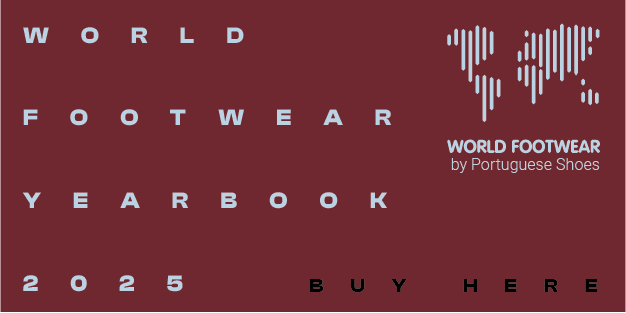William Wong, Vice President of the Hong Kong Footwear Association, live on World Footwear

We spoke with Mr William Wong, who holds a profound experience in the footwear industry and will be one the speakers of the upcoming World Footwear Congress in León, to hear his views on the current state of the industry and future challenges
Besides the position held at the local trade association, Mr William Wong is also President of Goddess International, Ltd, a company founded in 1994 and now one of the leading manufacturers of slippers, retailed in China since 2002 under the brand name Betta. William Wong also established IFG, Italian Fashion Galleria, which distributes and sells across China shoes and leather accessories "Made in Italy". IFG has four stores in Chengdu, China.
Mr William Wong holds the following positions: Founder / Executive Vice President of the Federation of Hong Kong brands, Member of Textile Training Council and Hong Kong, Member of the Advisory Council of the Expo RETAILASIA Consultant Association Shenzhen retailers.
An immense experience in the industry that adds an extreme interest to a conversation held with Mr William Wong to go over the state of the footwear industry.
In your view what were the more relevant aspects of the footwear industry worldwide, and in Asia in particular, in the last few years?
As a Chinese footwear manufacturer, I joined the industry in 1991. Over the years I saw the booming of Chinese production. New factories opened every month during the late 90's and each one is bigger than ever. However, it all changed in late 2000, especially after 2008, the economic crisis. On one hand, the demand in the developed countries has dropped. On the other hand, the productivity has increased significantly, not just in China but also new factories in South East Asia. There are new automotive machines that can produce shoes much faster and cheaper. So some factories are still able to maintain lower prices. Most manufacturers were hoping the global economic situation will improve and the demand will increase. Unfortunately, it is not going to happen. There are still way too much more supply than demand. So we are all in fierce competition.
I personally think the situation is going to get worse. This is because the cost for manufacturing is going up (labor and materials). Yet, the consumers around the world would not like to spend more. This means that the retailers are competing with each other for low price and trying to maintain their profit at the same time. So they squeeze their suppliers even more than ever. A lot of the manufacturers will have to close down. Then people are unemployed. Then consumption will drop. Then more competition...... We are going into a depression cycle. It all because our productivity have increased too much over the last 10 years.
As a manufacturer, we have to look deep into our own competitiveness. Are we able to compete on price, such as moving our factories to Africa or Burma? Are we able to compete with our services, such as design and quick replenishment? Or can we build our own brand start doing our own retail? It's all matter of survival now.
In your view, what will be the main challenges for the sector during the next few years? What priorities should be elected by the footwear companies?
The main challenge is over supply of all consumer production, not just footwear.
As a footwear company, we have to understand what our own strength is. We need to be very clear why our customers (consumers) should buy our products. There are many other options out there.
According to the HKTDC in the first few months of 2014 Hong Kong exports to its main destination markets have decreased (two digits decline in important markets as the US, Germany and Italy). Is this a worry for the industry? Do you have an indication that this trend is inverting?
Even though HK export figures have declined (there is barely any production in HK), I think the figures from China have increased. And, there is still more supply than demand. And almost everyone in the industry is barely hanging there or making very little profit. I think it would go on like this for some time. So we really need to improve ourselves to be more competitive.
There is a lot of buzz about luxury products and the potential that surrounds them as a result of a growing middle class, especially in Asia. How would you characterize the luxury market in Asia, and in your view what will be the trends for the sector?
The Asian economy is growing fast, especially China. And luxury products have been doing extremely well over the last 10-15 years in China. Personally I think it's mainly due to the Chinese culture of gifts. A lot of Chinese people would see the price of their gifts is related to the quality of their friendship. And of cause many luxury products were used for bribery. Hence since the new President got into power and cracked down corruption, the luxury market has slowed down significantly. On the other hand, the growing of middle class has created a huge buying power for good quality and good value consumer products. So I believe that China is a huge growing market for products and services with good value and good quality, for middle class.
Tell us about the main arguments to convince our readers to participate in the World Footwear Congress in November?
As I mentioned, there is more supply than demand, globally. And we are no long only competing with our friends or cousins in the nearby village. We need to understand better about the global market as well as your global competitors. This congress is the best place to understand what is going on around the world.
Mr William Wong holds the following positions: Founder / Executive Vice President of the Federation of Hong Kong brands, Member of Textile Training Council and Hong Kong, Member of the Advisory Council of the Expo RETAILASIA Consultant Association Shenzhen retailers.
An immense experience in the industry that adds an extreme interest to a conversation held with Mr William Wong to go over the state of the footwear industry.
In your view what were the more relevant aspects of the footwear industry worldwide, and in Asia in particular, in the last few years?
As a Chinese footwear manufacturer, I joined the industry in 1991. Over the years I saw the booming of Chinese production. New factories opened every month during the late 90's and each one is bigger than ever. However, it all changed in late 2000, especially after 2008, the economic crisis. On one hand, the demand in the developed countries has dropped. On the other hand, the productivity has increased significantly, not just in China but also new factories in South East Asia. There are new automotive machines that can produce shoes much faster and cheaper. So some factories are still able to maintain lower prices. Most manufacturers were hoping the global economic situation will improve and the demand will increase. Unfortunately, it is not going to happen. There are still way too much more supply than demand. So we are all in fierce competition.
I personally think the situation is going to get worse. This is because the cost for manufacturing is going up (labor and materials). Yet, the consumers around the world would not like to spend more. This means that the retailers are competing with each other for low price and trying to maintain their profit at the same time. So they squeeze their suppliers even more than ever. A lot of the manufacturers will have to close down. Then people are unemployed. Then consumption will drop. Then more competition...... We are going into a depression cycle. It all because our productivity have increased too much over the last 10 years.
As a manufacturer, we have to look deep into our own competitiveness. Are we able to compete on price, such as moving our factories to Africa or Burma? Are we able to compete with our services, such as design and quick replenishment? Or can we build our own brand start doing our own retail? It's all matter of survival now.
In your view, what will be the main challenges for the sector during the next few years? What priorities should be elected by the footwear companies?
The main challenge is over supply of all consumer production, not just footwear.
As a footwear company, we have to understand what our own strength is. We need to be very clear why our customers (consumers) should buy our products. There are many other options out there.
According to the HKTDC in the first few months of 2014 Hong Kong exports to its main destination markets have decreased (two digits decline in important markets as the US, Germany and Italy). Is this a worry for the industry? Do you have an indication that this trend is inverting?
Even though HK export figures have declined (there is barely any production in HK), I think the figures from China have increased. And, there is still more supply than demand. And almost everyone in the industry is barely hanging there or making very little profit. I think it would go on like this for some time. So we really need to improve ourselves to be more competitive.
There is a lot of buzz about luxury products and the potential that surrounds them as a result of a growing middle class, especially in Asia. How would you characterize the luxury market in Asia, and in your view what will be the trends for the sector?
The Asian economy is growing fast, especially China. And luxury products have been doing extremely well over the last 10-15 years in China. Personally I think it's mainly due to the Chinese culture of gifts. A lot of Chinese people would see the price of their gifts is related to the quality of their friendship. And of cause many luxury products were used for bribery. Hence since the new President got into power and cracked down corruption, the luxury market has slowed down significantly. On the other hand, the growing of middle class has created a huge buying power for good quality and good value consumer products. So I believe that China is a huge growing market for products and services with good value and good quality, for middle class.
Tell us about the main arguments to convince our readers to participate in the World Footwear Congress in November?
As I mentioned, there is more supply than demand, globally. And we are no long only competing with our friends or cousins in the nearby village. We need to understand better about the global market as well as your global competitors. This congress is the best place to understand what is going on around the world.











